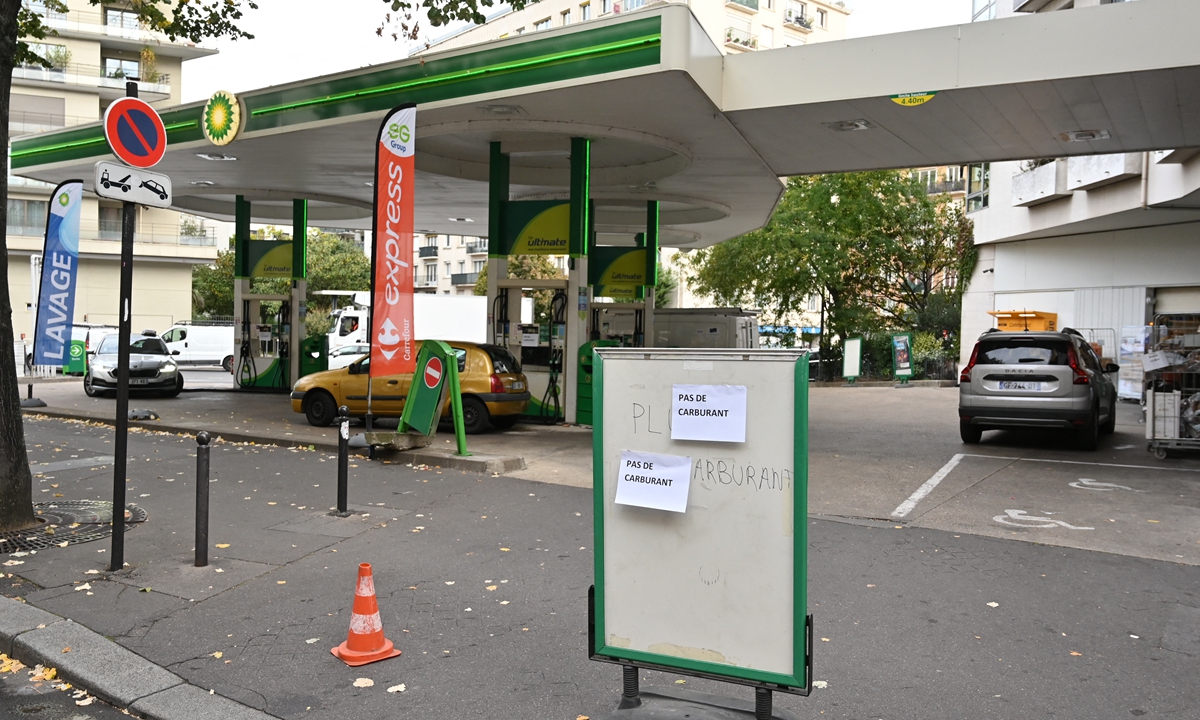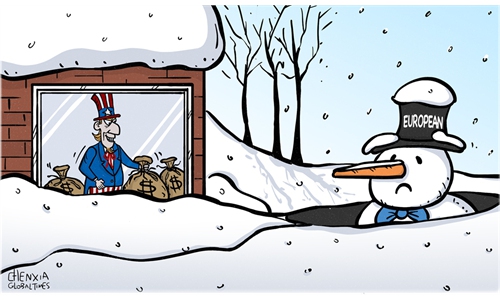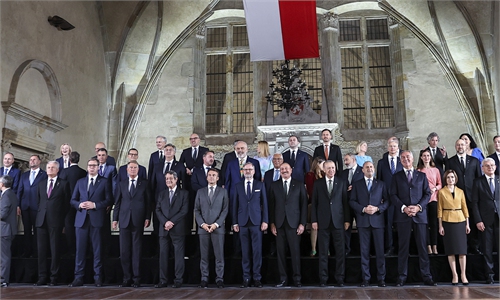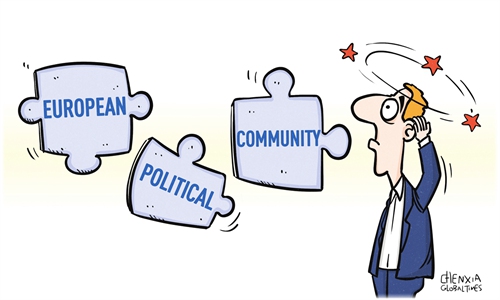Europe engulfed in deeper crisis as new waves of protests unfold over rising energy cost, inflation
Rising populism exacerbated by energy crisis dragging continent into long-term struggle

A gas station in the center of Paris is out of service due to fuel shortages on October 10, 2022. A strike at TotalEnergies and ExxonMobil has led to fuel shortages at many service stations in France for ten days. Photo: VCG
New waves of protests against rising living costs amid an escalating energy crisis have hit Europe in recent days, as many people were angry about their governments waging war on their own people by following the US in sanctioning Russia over the Ukraine crisis.Over the weekend, protests filled the streets of Paris, Berlin and Prague with some shouting out "leave NATO" or "Our country first", according to media reports, which analysts said hinted at a deeper crisis that Europe is now facing.
In a video shared by Florian Philippot, who leads the French nationalist party "Les Patriotes", hundreds of protesters shouted out "Leave NATO" on Sunday in Paris, waving French national flags and holding large banners reading "Resistance" and "Frexit" - a reference to a demand that France leave the EU, Russian media outlet RT said.
The protesters also denounced NATO "warmongering" and economic "disruption" linked to the sanctions that the EU imposed on Russia over the Russia-Ukraine crisis, according to the reports.
Similar scenes occurred in countries such as Germany, Czech and Moldova. Supporters of the far-right Alternative for Germany (AfD) party gathered in front of Berlin's Reichstag building on Saturday to protest rising prices in the country, German media outlet DW reported. The party's co-leader accused the government of waging war on its own people by sanctioning Russia over its military operation in Ukraine, the media report said.
Several thousand people gathered in Prague's Wenceslas Square on Saturday to voice concerns over rising living costs, the Xinhua News Agency said. The country's major trade unions organized the demonstration, calling attention to inflation and declining living standards in the Czech Republic, according to the report.
Also, demonstrations against the government in Moldova have been going on for more than a month, Sputnik said on Sunday, as the economic and energy crisis worsens in the country because of energy prices.
Currently, Europe is facing rising populism, and the sanctions against Russia have deeply hurt livelihoods, which will further exacerbate populism and become a bigger systemic crisis, Song Luzheng, a Paris-based Chinese scholar, told the Global Times on Monday. "The public demand for livelihoods will be used by far-right parties in local elections, posing a threat to the overall European political system," he said.
European countries are preparing to face a severe and tough winter as the energy crisis further escalates amid the worsening Russia-Ukraine crisis and the explosions on the Nord Stream pipelines, while the US is trying to use high energy prices to further weaken Europe's economy and force manufacturing industries to escape from the continent, according to observers.
Most recently, leaders from major European countries failed to reach a consensus during an informal summit on Friday in Prague on how to cut gas prices, which also cast a shadow over local families and businesses.
"It's just the beginning," Sun Keqin, a research fellow at the China Institutes of Contemporary International Relations, told the Global Times on Monday. The policies of the EU and NATO are not evolving into a direction that could help solve the problem, but Western countries continue fanning the flames on the crisis, leading to a vicious cycle, Sun said.
Now it's the energy crisis, and next it's the security crisis, which will continue causing public panic," he said.
With European leaders scheduled to meet next week in Brussels to address the energy crisis once again, observers said there is little they can do to stop the crisis even as some countries such as France and Germany have been ramping up efforts to diversify their suppliers, as some purchase energy from the US at much higher prices.
Now, European people are suffering, in the future, their manufacturing and industries will suffer, as the impact of the crisis will lower national financial revenues and weaken social benefits, eroding those countries' overall competitiveness, Wang Yiwei, director of the Institute of International Affairs at the Renmin University of China, told the Global Times on Monday.
"The crisis will be a long-term issue. For instance, German manufacturing could have used cheap Russian energy, but the good old days are over now," he said.
People in European countries such as Czech, France and Germany already protested in September over rising living costs, as more began to realize that they themselves are swallowing the bitter pill for their governments' "political correctness" strategy in following the US to sanction Russia.
While the protests currently reflect social problems, people are more concerned about Europe's security and uncertain future of the Ukraine crisis, which will turn into political problems that deal a blow to European leaders, Sun said. "European political elites should carefully reflect on where they are taking their countries."



